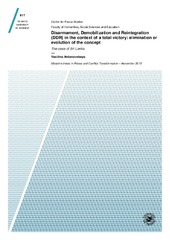Disarmament, Demobilization and Reintegration (DDR) in the context of a total victory: elimination or evolution of the concept. The case of Sri Lanka
Permanent lenke
https://hdl.handle.net/10037/9242Dato
2015-11-16Type
Master thesisMastergradsoppgave
Forfatter
Antonovskaya, VasilinaSammendrag
Several years ago a devastating civil war that raged in Sri Lanka for 3 decades between the state army and the Liberation Tigers of Tamil Eelam (LTTE), finally ended. One of the immediate issues that the country had to face in the aftermath of the war was dealing with the remnants of the LTTE combatants. For that purpose, the state launched the program of Demobilization, Disarmament and Reintegration (DDR). The program appeared to be unique in many ways, different from the DDR programs initiated and conducted by the UN in other countries recovering from civil war. One of such features distinctive for Sri Lanka, was that DDR was launched in the absence of the ceasefire or peace agreement between belligerents, in the condition of a total victory of the state army. What has attracted the attention of the international community, was the full monopoly on the development and execution of the program by the government of Sri Lanka, with the UN left outside.
In this research project I look into how DDR in Sri Lanka is different from the conventional vision on DDR. I bring up a question on whether the Sri Lankan DDR is simply a tool for maintaining the political influence, or it challenges the very understanding of the concept. To analyse the data collected during the fieldwork in Sri Lanka, I employ theories on statehood, human security and peacebuilding.
Forlag
UiT Norges arktiske universitetUiT The Arctic University of Norway
Metadata
Vis full innførselSamlinger
Copyright 2015 The Author(s)
Følgende lisensfil er knyttet til denne innførselen:


 English
English norsk
norsk
